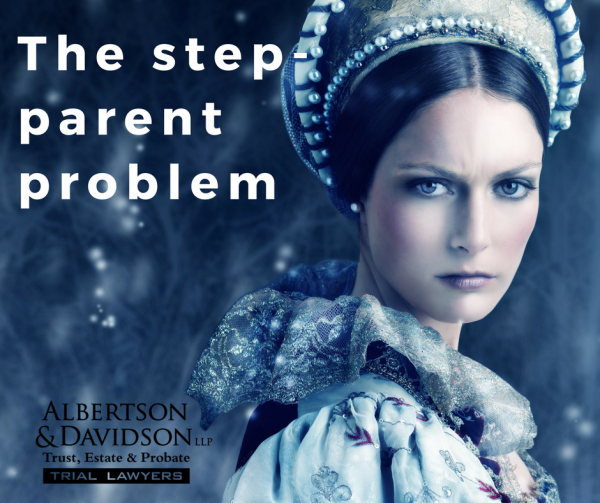
The answer is maybe, but you’re going to face an uphill battle. Unfortunately, the law does not give you an automatic right to receive a parent’s assets. The step-parent problem may be one of the most difficult, and least understood, issues in Trust and Will law. And it can play out in many different ways because people (1) do not have a solid estate plan to begin with, and (2) spouses do not want to discuss financial issues that cause tension in their marriage.
In a perfect world, a parent who has children from a prior marriage would want to create an estate plan that takes into account the spouse and the children. And there are many great ways in which revocable Trusts can be used to provide for the step-parent’s care and then leave the remaining assets to the children.
If an estate plan is not in place, however, or if there is a Trust that was not properly created, then problems arise. To determine if you can contest assets passing to a step-parent, you first must determine how the assets are owned. For example, assets owned in joint tenancy between your parent and the step-parent are going to pass automatically to the step-parent. There is no need for probate and the asset is not governed by a Trust or a Will, it simply passes under California law. There is a way to contest assets passing by joint tenancy, but it typically is more difficult than simply challenged a Trust or Will because you have to prove your case by “clear and convincing” evidence rather than “preponderance of the evidence.” All you need to know here is that clear and convincing is a more difficult standard to prove in court. As a result, property passing to a step-parent by joint tenancy is very difficult to challenge.
If the assets were held in a Trust, and the Trust language states that all assets pass to the step-parent after your parent dies, then you have to bring a Trust contest lawsuit. And your trust contest must be based on either lack of capacity or undue influence. These can be hard claims to make if your parent had capacity. Further, it can be difficult to prove that a spouse unduly influenced your parent because the law requires spouses to support each other. There certainly are instances where spouses do unduly influence each other, but proving undue influence is more difficult between spouses from a practical perspective. Spouses naturally influence each other all the time. It can be difficult for the court to determine where spousal influence crossed the line into undue influence, especially where the spouse is supported after death.
There may also be assets passing by beneficiary designations, such as life insurance policies, retirement accounts, and pay-on-death or transfer-on-death bank accounts. Like joint tenancy assets, these types of transfers can be challenged, but it is more difficult to do so.
The bottom line: your parent has the right to leave all of his or her assets to a step-parent. Whether they do so by choice, or just by lack of proper planning, makes little difference because it places the burden on you to challenge the transfer of assets. Unfortunately, you do not have an automatic right, as a child of your parent, to receive your parent’s property. The law presumes that your parent knew exactly what he or she was doing when the assets were left to the step-parent—it can be a rude awakening. The result is all the more harsh when the assets passing to the step-parent are family assets, such as real property that was in the family for multiple generations, or heirloom jewelry.
So what would a well-planned estate that protects your rights to a parent’s property look like? For starters, it would include a revocable Trust that your parent creates either alone or in conjunction with a step-parent. The Trust would have provisions that would (1) give you assets immediately upon a parent’s death, (2) create a subtrust that benefits the stepparent during his or her lifetime and then gives you the assets, or (3) a combination of both. The benefit of using a subtrust is that the step-parent can receive support from the subtrust during his or her lifetime, but the step-parent does not own the assets—that is, they cannot dictate how the assets pass after the step-parent’s death. This allows the subtrust assets to benefit the step-parent and then pass whatever is left over to you.
Creating a revocable trust with a subtrust to benefit the step-parent is standard practice in estate planning. These Trusts are commonly used where you have a married couple who have kids from prior marriages that they want to benefit. You can easily set up an estate plan of this sort and protect the assets; provided that, the assets are titled in the name of the Trust after the Trust is created (remember a Trust only controls the assets titled in its name—nothing else).
In a perfect world, you would go a step further an also have a pre-marital agreement that (1) sets out each spouse’s rights to separate property, (2) protects against any commingling of assets, and (3) provides for inheritance rights (or cuts off inheritance rights depending on the desires of the parties). A pre-marital agreement takes the plan one step further by precluding the step-parent from having a right to inherit property unless it meets the requirements under the pre-marital agreement. A pre-marital agreement, combined with a properly drafted revocable Trust is the best protection children can have to preserve assets after a parent’s death.
